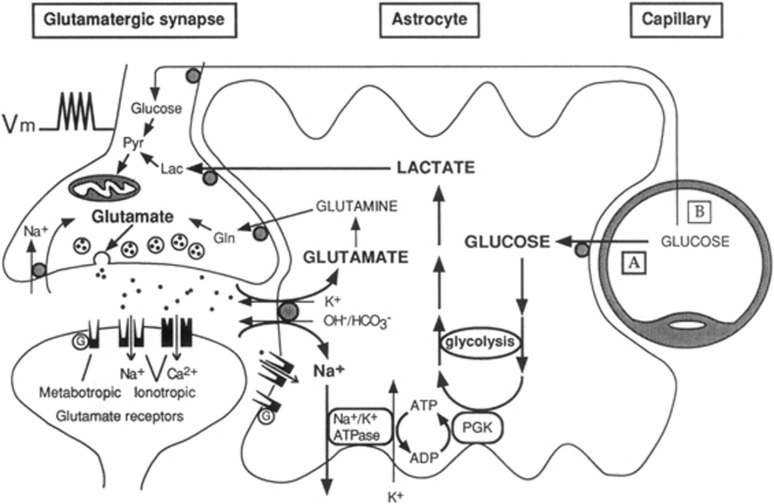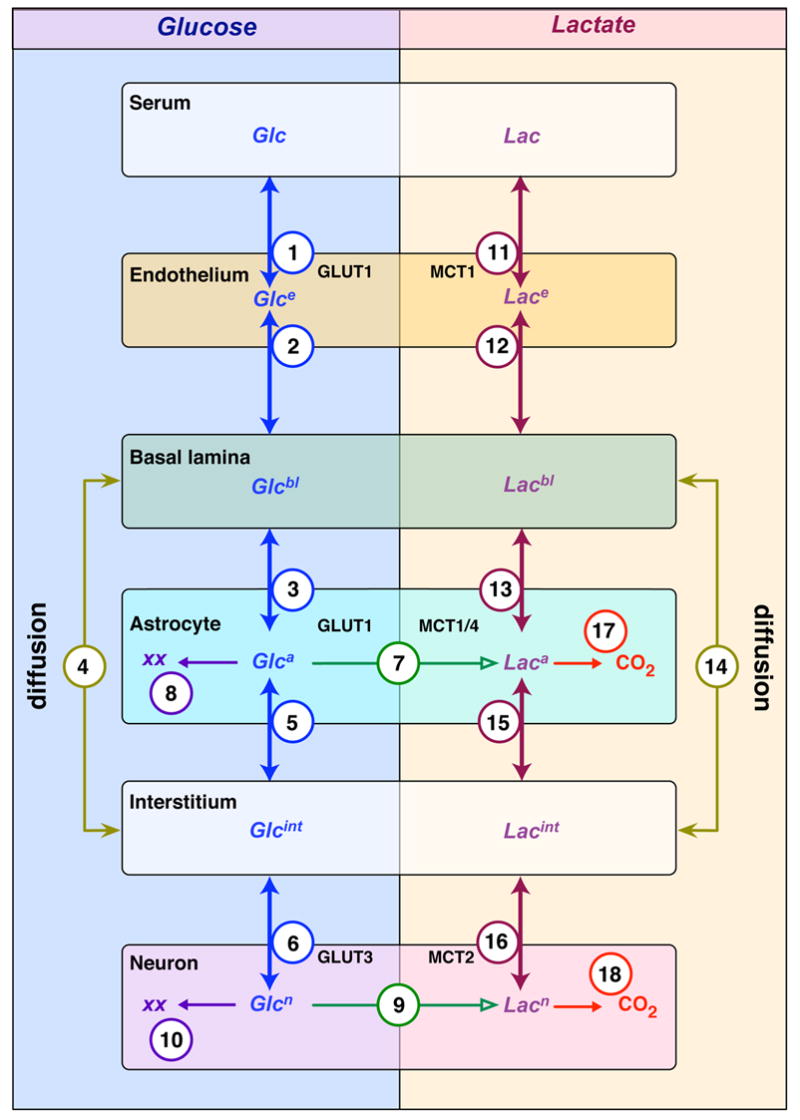Brain Glycogen
2022-05-03: reference:
Brain Glycogen #
Astrocytes #
Astrocytic glycogen represents the only form of glucose storage in the Brain.
-
Astrocytes receive glucose via GLUT on them whereby it… simply ferments into lactate, and then released into the extracellular fluid and transferred to neurons via MCT2.
- Astrocytes of course have mitochondria. But I don’t think glucose is exported.
- Aerobic is technically possible but they strongly favor lactate regardless of oxygen presence. A real shame since they interface with the BBB and could pick up some oxygen if they wanted to, right?
- Well, it all makes sense now. Lactate Dehydrogenase is reversible. I guess they just don’t bother shuttling pyruvate to the pyruvate dehydrogenase complex.
-
- It’s long but I think this is everything I need.
-
Glycogen in astrocytes: possible function as lactate supply for neighboring cells
- On glucose deprivation, astroglial cells rapidly deplete their glycogen. In contrast to the situation with hepatocytes, only lactate, but not glucose, is detectable in the medium surrounding the astroglial cells
-
- At exhaustion, muscle glycogen was depleted but brain glycogen was only decreased. MCT2 levels increased and so did MCTs in the brain.
-
Sleep and Wake Affect Glycogen Content and Turnover at Perisynaptic Astrocytic Processes
- [Energy Metabolism of the Brain, Including the Cooperation between Astrocytes and Neurons, Especially in the Context of Glycogen Metabolism]
-
- consume huge amounts of glucose and produce lactate regardless of sufficient oxygen availability, indicating a high capacity for aerobic glycolysis.
-
Astrocyte-neuron lactate transport is required for long-term memory formation
- Glycogenolysis and astrocytic lactate transporters are also critical for the induction of molecular changes required for memory formation, including the induction of phospho-CREB, Arc, and phospho-cofilin.
- Commentary: Astrocytes: powering memory
Astrocyte-Neuron Lactate Shuttle Hypothesis #
-
Glutamate uptake into astrocytes stimulates aerobic glycolysis: a mechanism coupling neuronal activity to glucose utilization (1994)

- For the sake of simplicity, omitted was the possibility of lactate uptake on the postsynaptic neuron, and astrocytic glutamate receptors.
- Sweet sixteen for ANLS (Pellerin & Magistretti, 2012)
-
In Vivo Evidence for a Lactate Gradient from Astrocytes to Neurons Essentially, Gly_Ast always > Gly_Neu.
- Under artificially increased blood Pyruvate, it enters astrocytes via MCT, forcing exclusion of lactate. Pyrvate entry and concurrent lactate exit via Monocarboxylate Transporters requires relatively high intracellular lactate levels.
- Commentary: [Are Astrocytes the Pressure-Reservoirs of Lactate in the Brain?](Are Astrocytes the Pressure-Reservoirs of Lactate in the Brain?)
- Computer simulations of neuron/astrocyte energetics, based on fMRS data, support a model in which neurons readily metabolize glucose and export lactate, which is taken up by astrocytes, and not the other way around:
Supply and demand in cerebral energy metabolism: the role of nutrient transporters
-

- 4 and 14 are the big takeaways from this study; they make the case that this ready diffusion is the primary factor responsible for glucose uptake/metabolism/lactate generation observed on neuronal activation.
-
Brain glycogen re-awakened #
- Given its astrocytic location glyocgen is ideally positioned to provide energy substrate to the neurons, and a prominent role for glycogen in supporting brain function is highly likely.
- Glycogen content falls first in areas with the highest metabolic rate.
- In mouse cerebral cortex glycogen content is higher in the superficial layers than in the deeper layers.
- Brain glycogen accumulates during sleep, is mobilized upon waking, and that sleep deprivation results in region-specific decreases in brain glycogen.
- During insulin-induced hypoglycemia, when the brain’s demand for energy exceeds blood-borne glucose supply, glycogen is degraded to support brain function. However, once glyogen content is depleted during constant hypoglycemia, brain function fails and may suffer irreversible injury.